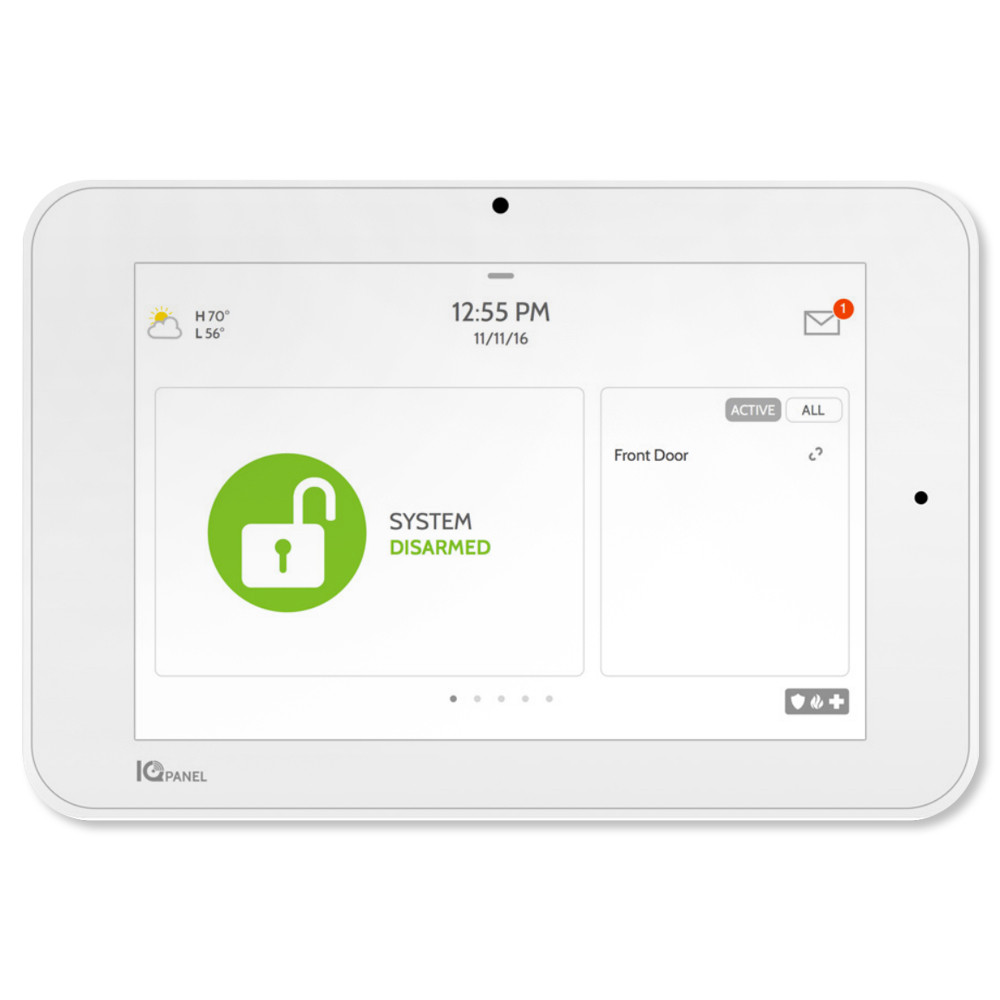At Northeast Security Solutions, we do not believe in taking a “set it and forget it” approach to home security. Unfortunately, many customers install an alarm system and fail to follow best practices for system and monitoring maintenance. This can lead to your security failing to work efficiently when you need it most. Morevover, it can lead to your alarm’s performance failing after years of neglect. We recommend taking steps at every opportunity to keep this from happening to you. This includes reaching out to your security provider when appropriate. In this post, we share some tips to help you know when to call your alarm company.
We will begin with a look at how your alarm itself can give you clues that you should call your security provider. Modern alarm systems contain self-diagnosing technology that truly helps with maintenance and troubleshooting. From there, we will look at why you should make a call before performing home renovations. Next, we will share why you should alert your security provider before switching — or cancelling — home phone service. We will also look at how contacting your alarm company can help maintain effective alarm monitoring when you travel. Finally, we’ll explain how to test your alarm, and why you should pick up the phone before doing so. Now, let’s get started by showing you how “mysterious” alarm status updates could spell trouble.

The QOLSYS IQ Panel 2 has a modern touchscreen display that makes understanding system status messages easy and intuitive.
Receiving Mysterious Status Updates
Last year, we created a post sharing some Signs You Need a Security Upgrade. In that post, we explained the importance of owning an alarm panel that clearly displays system status updates. Older alarm keypads communicate status updates with flashing lights and “beeps.” However, newer alarm keypads have LCD displays that spell out any status updates in plain language that you can easily understand. The latest and greatest alarms, such as our preferred model by QOLSYS, even have a full-screen touchscreen display that makes scrolling through status messages easy and intuitive!
Unfortunately, even easy-to-read alarm statuses can still create confusion for homeowners. Messages such as “Zone 1 Trouble,” “Communication Failure,” and others often puzzle customers. Rather than unplugging your alarm, pick up the phone and call your alarm company. They can explain what these status updates mean and help you take the steps to fix the issue. Sometimes, customers unplug their alarms just because a sensor needed a battery and they didn’t know what to do! We don’t expect you to translate all of the messages your alarm gives you. After all, we do this for a living, not you. Calling for help in this situation allows you to avoid “making a mountain out of a mole hill.” Now, let’s take a look at the potential impact of home renovations on your alarm.
Performing Renovations on Your Home
Most alarm systems contain some hardwired elements. In fact, many alarms have wires running from the alarm’s control board to every device on the system! Therefore, knocking down walls and replacing doors and windows can threaten your alarm’s wiring. Often, homeowners do work on their home that damages security system wiring. When this happens, we have to go in after the fact and attempt to create a solution retroactively. Of course, we prefer a proactive approach to these situations.
If you call your alarm company before beginning this work on your home, we can see how the work will affect your security system. From there, we can create a plan that allows your alarm to work as soon as possible after completing your renovations. This will save you both time and money — and keep you from losing your security! Next, let’s look at how another type of change within your home can affect your alarm’s performance.
Servicing (or Cancelling) Your Phone Lines
These days, more homes than ever rely strictly on cell phone communication rather than old-fashioned phone lines. Of course, this saves families money without any true drawbacks. Unfortunately, taking this step often has an unintended effect. The majority of alarm customers have monitored alarm systems that create an emergency dispatch when necessary. Monitored security systems must communicate with a central station to make this happen. Upon receiving an alert, a central station dispatcher then calls the premises and, if necessary, the proper authorities.

If you are away from home — especially if you are in “vacation mode” — you may not be available to answer a call if your alarm goes off.
Traditionally-monitored alarms communicate to the central station using a property’s existing phone lines. Therefore, changing providers or cancelling service altogether will also “cancel” your alarm’s monitoring! For this reason, we suggest you call your alarm company before making this type of change. Most security providers offer products to make phone lines unnecessary for alarm monitoring. For example, our cellular dialer, powered by Alarm.com, creates a direct path between your alarm and our central station. This allows your alarm monitoring to continue regardless of how well your phone lines work. In addition to allowing you to cancel your phone service, this provides a more secure means of monitoring! Let’s shift gears now and discuss how you can keep your monitoring as effective as possible during your travels.
Going on Vacation or Traveling
Here, you may be thinking, “Why would I call my alarm company before going on vacation? Can’t I just set my alarm and leave?” Indeed, you can do so, but this tip revolves around what happens after an alarm activation. As we mentioned above, your central station will call the premises to check in first upon receiving an alert. Of course, in your absence you will not answer the phone. From there, the central station will dispatch the police or fire department, depending on the nature of the alarm.
At this point, the central station will begin calling a “call list” of numbers that you provide upon your alarm’s installation. This is where things can get tricky if you’ve left the house for a long period of time. The central station will likely have trouble reaching you and any other family members on your call list who may have traveled with you. Therefore, it may take quite awhile for anybody to hear about the alarm event. Sometimes, by the time someone does get to follow up, the police have already visited your property.
For this reason, we recommend updating your contact list when you travel. Doing so will create a more efficient response to a potential emergency. You can call your alarm company with a new call list at any time. Furthermore, you can even create a “start” and “end” date for your temporary contact sheet. This allows you to return from your vacation without the need to “undo” your call list changes. Last but not least, let’s look at how we help customers test their fire and burglar equipment.

Periodically testing your alarm system can help ensure its proper operation when you need it most.
Testing Your System Smoke Detectors or Burglar Devices
We’ve long advised customers to test their alarm’s devices. Many of our customers install monitored smoke detectors with their security system. Just as with non-monitored smoke alarms, we recommend testing these detectors regularly. Furthermore, we also encourage customers to test their burglar alarm by activating it and making sure that doing so creates the proper siren and central station response. However, we do not suggest doing this as a “live” test. Setting your alarm off and waiting for the central station to call could lead to an unintentional emergency dispatch if you set off multiple alarms and miss a phone call. Furthermore, the central station prefers not to respond to “test” signals if at all possible.
If you want to test your alarm system, call your alarm company and let them know. This allows them to place the system on “test” mode so that the central station does not call upon receiving the alert. When we help customers perform a system test, we stay on the line with them. We have the ability to watch our customers’ alarms send signals to our central station in real time. Therefore, we can let customers know as soon as we see the alarm’s alerts come through. At that point, we take the alarm off of “test” mode, while you receive the peace of mind that comes from knowing your alarm is ready to send for help if you need it.
Calling Your Alarm Company to Ensure Continued Service
We hope that this post helps you know when to call your alarm company, and why. Additionally, we encourage you to contact us with any questions you may have. Obviously, we believe installing an alarm system to be a worthwhile investment. However, doing so and then failing to reach out to us when you should can lead to frustration and a less effective security experience. Therefore, we hope that you can use us as a resource whenever we are needed. Together, we can install, service, and help you maintain a security system that keeps you and your family as safe and secure as possible!
